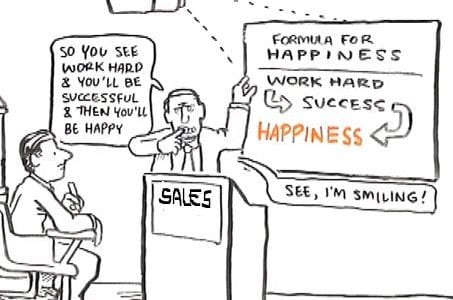by Shawn Achor – June 2013
What is the connection between happiness and sales? Most salespeople tell me it’s an easy question: “When I’m selling then I’m happy.”
How could so many salespeople possibly be wrong?
Undeniably, we feel happier after a sale, but that common answer is actually holding down our happiness and lowering our sales.
Researchers at Harvard, Yale and UPenn have been studying this issue now for two decades. We found predicting who will be a good salesperson is relatively easy. We just look for optimism.
Optimists beat pessimists
When we ran the numbers, optimistic salespeople outsell their pessimistic counterparts by 37% cross-industry. At MetLife, the top 10% of optimists were outselling the other 90% by another 90%! That’s huge, and here’s why.
Most professionals face daily setbacks, but the life of a salesman is, almost by definition, fraught with failure and rejection. In many businesses, only one in ten pitches leads to a sale, meaning that those salesmen experience rejection 90 percent of the time. (That was also my dating rejection rate in high school.) This can get pretty demoralizing after a while, which helps to explain why there is such high turnover, stress, and depression.
But here’s where it gets interesting: it turns out if you wait until a sale to be happy, you’re following a broken formula for happiness and success. We think:
[dropshadowbox align=”center” effect=”curled” width=”375px” height=”” background_color=”#ffffff” border_width=”1″ border_color=”#dddddd” ]
Wrong thinking
I will work hard, then I’ll be successful, then I’ll be happy. [/dropshadowbox]
But every time you were successful in the past, what happened? Your brain changed the goalpost of what success looks like. If you hit your sales target last year, what did you do this year? Raised it. Happiness after a success (like a sale) is very short-lived.
But flip around the formula and try to create happiness before the sale, and our success rates rise dramatically. (Want to know more about the effects? Watch this video on TED.com.)
[dropshadowbox align=”center” effect=”curled” width=”450px” height=”” background_color=”#ffffff” border_width=”1″ border_color=”#dddddd” ]
Right thinking
If I create happiness before the sale, then I’ll be more successful selling. [/dropshadowbox]
The Happiness Advantage
In The Happiness Advantage, I describe how positive brains have an unfair advantage over negative or neutral ones. Positive employees:
- have higher levels of productivity,
- produce higher sales,
- perform better in leadership positions, and
- receive higher performance ratings and higher pay.
So how do we create happiness before success?
- Realize happiness only exists in the present, otherwise it will always be off in the future (never).
- Train your brain to become happier.
- Happiness is not only a choice, it is a work ethic:
- Write down 3 new things you’re grateful for each day for 21 days. This rewires your brain for optimism.
- Journal for 2 minutes each day about a positive experience. This is the fastest intervention for seeing the meaning embedded in your work.
- Write a 2 minute positive email or handwritten note to someone. This deepens social support, the greatest predictor of long term happiness.
Evidence
One way to train your brain to become happier is to smile more.
At a group of hospitals in post-Katrina Louisiana, we trained 11,000 employees to just smile and make eye contact in the hospital hallways. Within 6 months, the number of unique patients rose and their likelihood to refer the hospital based on good care skyrocketed.
At KPMG, I found that just teaching this concept (happiness first; success second) and practicing a positive habit can create greater happiness and job effectiveness 4 months later, in the middle of the worst tax season in recent history.
Happiness is a choice, but also an incredible advantage. Do you want to see your true sales potential? See what you can do when your brain is set on positive!
[dropshadowbox align=”center” effect=”lifted-both” width=”650px” height=”” background_color=”#ffffff” border_width=”1″ border_color=”#dddddd” ] I can’t help but think back to some of the best sales people I’ve worked with and their attitude – pretty positive. I also can’t help but think of the people I’ve let go in the past year, all very pessimistic. Another interesting angle to look at would be the affect an optimistic person has on a potential client. Essentially, people like to buy from people they like and people like positive and friendly people. ~ Chip Maxon, Sr. Vice President, Business Operations, Sacramento RiverCats[/dropshadowbox]
I can’t help but think back to some of the best sales people I’ve worked with and their attitude – pretty positive. I also can’t help but think of the people I’ve let go in the past year, all very pessimistic. Another interesting angle to look at would be the affect an optimistic person has on a potential client. Essentially, people like to buy from people they like and people like positive and friendly people. ~ Chip Maxon, Sr. Vice President, Business Operations, Sacramento RiverCats[/dropshadowbox]

